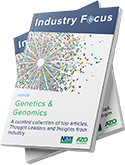UK patients will benefit from a new partnership with Thailand to share expertise of genome sequencing, collaborate in research, education and training opportunities, knowledge exchange and genomics data handling.
Yesterday afternoon (Thursday 19 January) the Memorandum of Understanding was signed by UK Health Minister Lord Nick Markham CBE and Thailand's Minister for Public Health and Deputy Prime Minister H. E. Anutin Charnvirakul. Both countries have committed to working together on genomics and understanding rare and undiagnosed diseases and cancer, as well as building stronger academic and institutional links through working groups that could start as early as February 2023.
The collaboration will allow the two countries to better share information on genomics, the study of people's DNA, including Genomics Thailand's 50,000 Genome Initiative and the UK's pioneering 100,000 Genomes Project led by Genomics England.
Genomic sequencing can speed up diagnosis of cancer, ensure patients with treatable illnesses receive treatment faster and improve our understanding around how health outcomes differ by ethnicity to tackle inequalities.
A key lesson learnt from the Covid pandemic was that collaboration with international partners is crucial to building our own resilience to health threats. Thailand has world-leading genomics capabilities, so the landmark new partnership will help to broaden the UK's expertise in this field and cement our status as a global life sciences superpower.
Genomics has the power to revolutionise healthcare in the UK and across the world, so it is brilliant to be joining hands with Thailand for this exciting partnership. Both countries share the common goal of enhancing our healthcare systems with innovative technology and scientific understanding to reduce inequalities and ultimately save lives.
We look forward to working closely with our counterparts in Thailand to bolster our ability to offer diagnosis for rare diseases and develop cutting-edge treatments.
Through our commitment to sharing knowledge, exploring training opportunities and pioneering joint research initiatives we can collaborate to deliver better health outcomes at lower costs."
Lord Nick Markham CBE, UK Health Minister
Chief Executive of the UK Health Security Agency Dame Jenny Harries said:
"Improving the world's ability to monitor and detect newly emerging pathogens is critical for global health security. The COVID-19 pandemic demonstrated clearly how vital genomic surveillance is in helping us detect and prepare for new dangers to global public health.
"International co-operation is a crucial part of developing this capability. I welcome this agreement with the government of Thailand which will strengthen our ability to closely monitor and respond to new health threats. I look forward to a fruitful and productive collaboration."
Thailand's Minister for Public Health and Deputy Prime Minister H. E. Anutin Charnvirakul said:
"This is the first partnership between Thailand's Ministry of Public Health and the UK's Department of Health and Social Care. It marks an important step for genomics collaboration between the two countries.
"With mutual interest, Thailand and the UK will come together to share knowledge and best practices in genomics medicine, including data handling, ultimately to help treat and protect the people from diseases that we may have never been able to do so before."
Genetics & Genomics eBook

Chief Scientific Officer for Genomics England Professor Matt Brown said:
"The potential for genomics to revolutionise the way we deliver healthcare is great and we're already starting to see this transformative science being adopted across many areas of medicine. We're delighted to partner with Thailand and share our knowledge and experience to put the promise of genomics into practice and bring benefits for patients worldwide."
Building on the success of the ground-breaking 100,000 Genomes Project – which has already helped diagnose rare disease in hundreds of children – the government recently allocated new funding to genomics to ensure a better quality of life for UK patients. In December 2022, £175 million was awarded in new genomics funding to ensure a better quality of life for our patients, putting the NHS on the front foot and affirming our position as a life sciences superpower.
This funding will build on the world-leading work of the NHS Genomic Medicine Service, harnessing innovation to drive improvements across the health system.
The funding also included £25 million of UKRI-MRC funding for a UK-wide new initiative on functional genomics, an area of genomic research which uses molecular tools such as gene editing to improve understanding of how genetic variation leads to disease and support smarter diagnostics and the discovery of new treatments.
The Memorandum of Understanding builds on the Life Sciences Vision set out in 2021, which commits to delivering a world-class offer on functional genomics and the UK is in a strong position to become a leader in this area.
Notes to editors:
The NHS Genomic Medicine Service aims to enable the NHS to harness the power of genomic technology and science to improve the health of our population and deliver on the commitments in the NHS Long Term Plan including to:
- To be the first national health care system to offer whole genome sequencing as part of routine care, including for all children with cancer or children who are seriously ill with a likely genetic disorder.
- Increased access to molecular diagnostics and offer genomic testing routinely to all people with cancer.
- Improve early detection and treatment of high-risk conditions including expanding genomic testing for familial hypocholesterolaemia.
- Linking and correlating genomic data to help provide new treatments, diagnostic approaches and help patients make informed decisions about their care.
These commitments will be delivered by the NHS Genomic Medicine Service for England which will provide:
- Consistent and equitable care for the country's 55 million people.
- Operate to common national standards, specifications and protocols.
- Deliver a single national genomic test directory covering use of all technologies from target genomic testing to whole genome sequencing.
- Give all patients an opportunity to participate in research for their individual benefit and to inform future care for other patients.
- Build a national genomic knowledge base to provide real world data to inform academic and industry research and development.
GOV.UK
Posted in: Genomics | Healthcare News
Tags: Cancer, Children, covid-19, Diagnostic, Diagnostics, DNA, Education, Foot, Gene, Genetic, Genetic Disorder, Genome, Genomic, Genomic Sequencing, Genomics, Global Health, Health Care, Healthcare, Medicine, Molecular Diagnostics, Pandemic, Public Health, Rare Disease, Research, Social Care, Technology, Whole Genome Sequencing
Source: Read Full Article



